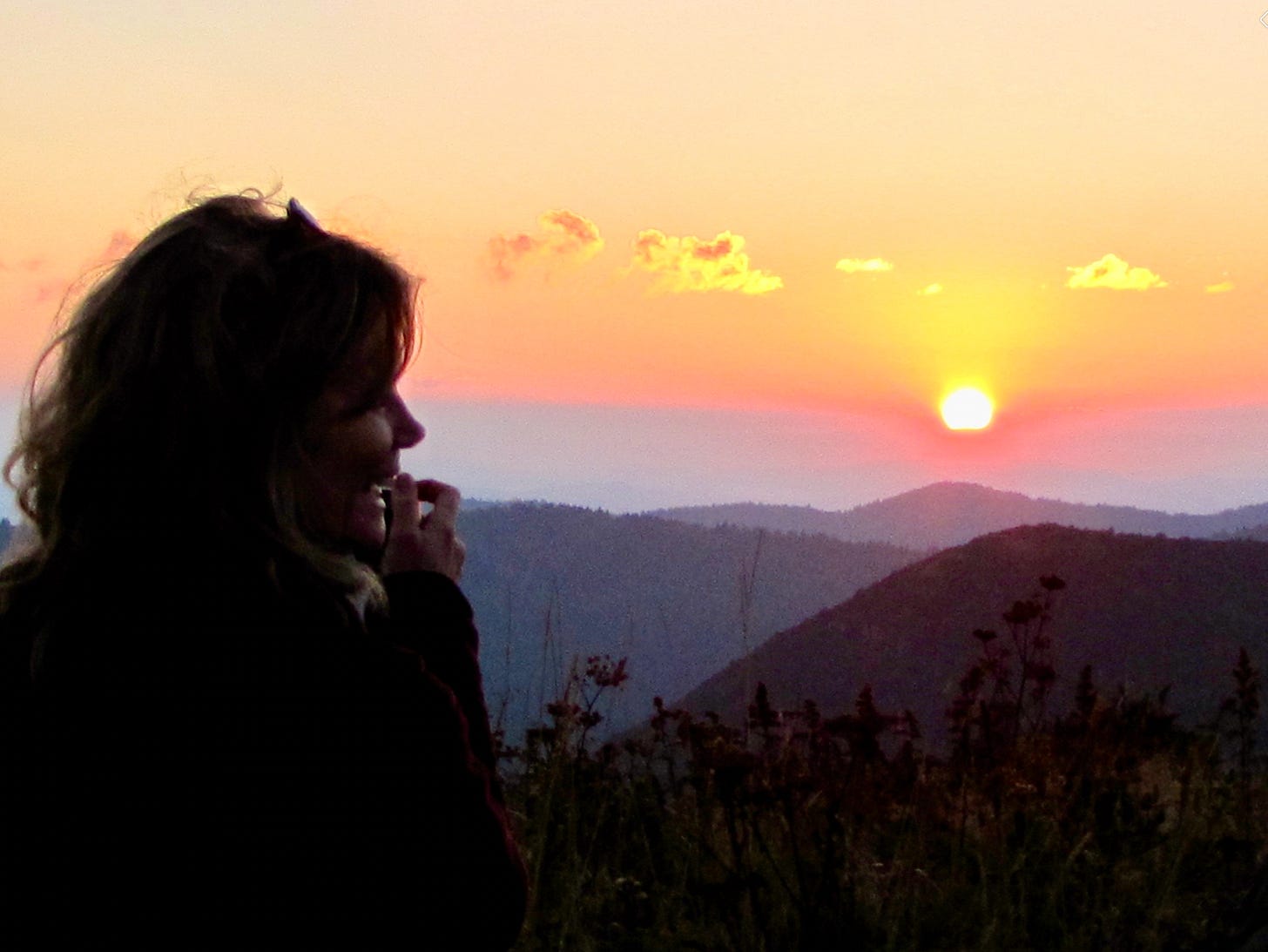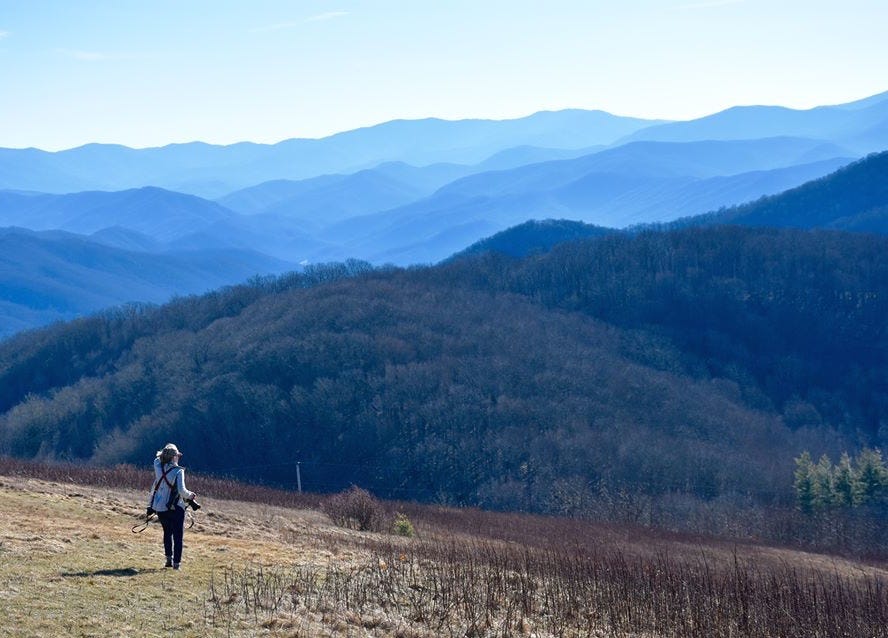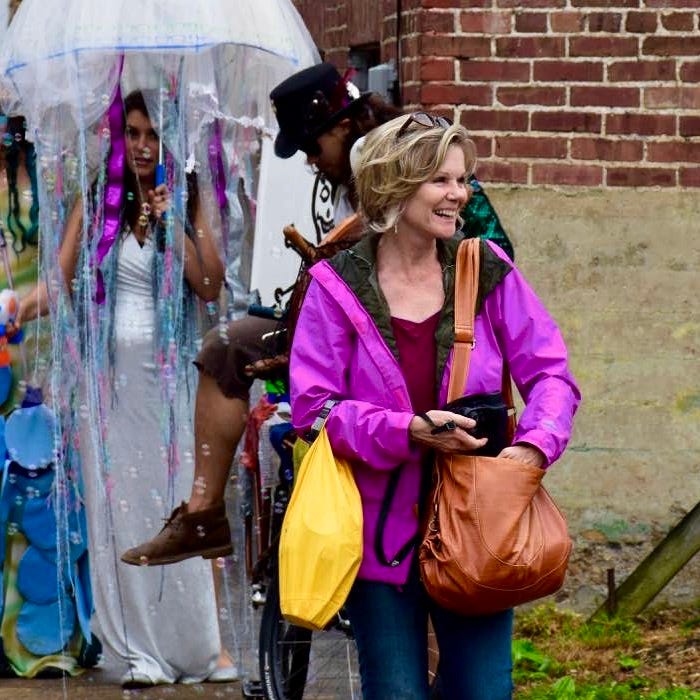She felt some measure of relief knowing that in the very least, on the open road she would have some time to think. Dave Eggers
A few years into freelancing in various capacities in that invisible world in between documentary film makers and public television, word of mouth about what I was doing started getting out and work slowly began to pick up. More projects from Bill Moyers, WNET and the Fred Friendly group at Columbia University came in, keeping me busy and funded. Even though it wasn’t steady, I was earning more than I’d been paid at the documentary workshop.
In the first half of the 2000s, two documentaries came my way with a similar theme but targeting different age demographics. Both involved life changing road trips and that caught my attention. I like road trips!
Back in the early 1980s, my mother and I spent ten days driving in Denmark, merrily eating and drinking our way around the country, visiting homes, apartments and farms. I introduced her to my colleagues at Kvadrat, the astonishing, contemporary Danish textiles company I was working with at the time, and she in turn introduced me to all my Danish relatives, all of whom greeted us with open arms, welcoming us into their lives and their culture. We had such a great time, she sponsored another trip during the 1990s, this time with ten-year-old Zoë – a three-generation trip to see all our Danish family again and introduce the young cousins to one another.
I also took a road trip with my father in the 80s, driving from Chicago to San Diego. In the wake of my parents’ divorce the previous year, I suggested the idea only after I heard he was planning to do the drive solo in an old station wagon. My father was not a keen driver. Often lost in thought, solving work problems, he got easily bored behind the wheel. Setting aside my anger, I volunteered to drive so he would at least reach his destination. My father responded enthusiastically to my offer, which surprised and touched me.
Intuitive as he was about people and computers, Dad knew very little about cars. So, in preparation for our trip, I took a AAA course on basic car maintenance, including changing tires, oil, and doing battery checks. I also bought a basic car toolkit with cables, etc. Not that I was sure how to use any of it, but at least I’d be prepared for whatever might befall us.
I soon discovered Dad had also been thinking about the necessary preparations for our adventure. He met me when I arrived at O’Hare airport and, opening the back of his car to load in my bag and toolkit, proudly gestured to the provisions he’d stocked up on for our 36-hour, 1730-mile adventure. I gasped in astonishment. The back of the car was filled with Cheerios, Hires Root Beer, and red Twizzlers – my favorite childhood foods I’d missed during the years we lived in London. He remembered! Realizing that, I set aside my unhappiness about the divorce; our trip was already off to an amazing start.
Over the next four days, with nobody else to talk to, we got to know one another in an entirely new way. Dad always took ‘the morning shift’ – driving west for the first three or four hours each day before he got too bored with it. I took the five hours in the afternoon, stopping at nearly every scenic overlook to take photographs in Colorado, Utah and Nevada.
It was the middle of the summer and as the old car had no air conditioning, we drove with the windows rolled down, Country & Western music (Dad’s choice) playing on the radio whenever we were close enough to civilization to get reception. Driving west, that meant Dad’s left arm was exposed to the sun in the morning while he drove, and his right arm was exposed to the sun in the afternoon when it was my turn to take the wheel. By the time we reached southern California, he had two nicely tanned arms and already looked like he belonged there. I, however, was still pale as a ghost.
Despite that, it was a very healing trip and my relationship with my father had entered a whole new phase. Many jokes were born of that trip, establishing memories we cherished and tossed back and forth at each other the rest of his life.
So, when not just one, but two documentaries involving open roads and road trips came my way, it seemed like more than a suggestion.
The Open Road: America Looks at Aging was an hour-long documentary that explored the possibilities and potential for America's 77 million Baby Boomers reaching the “Third Stage of Life.” Rejecting their parents’ version of retirement, Boomers were instead charting a course of innovative and imaginative reinvention. It was a perfect fit for the PBS audience, and director Nina Gilden Seavey, a filmmaker and research professor of History, Media and Public Affairs at George Washington University and director of the GW Documentary Center, wanted my help getting it on the air on PBS stations all over the country.
Somewhere around that time, I also got a surprise call from Amy Wallens Green at PBS.
“I have a kind of rough but also kind of cool project, and so I thought of you,” she said. That alone appealed to me.
“It’s about these three guys who just graduated from Pepperdine University. They don’t know what to do with their lives, they only know they don’t want to go the route of their parents’ expectations.
“So, they set off driving across the country in an old RV they painted shocking green,” she continued, “seeking out interesting and successful people to interview in an effort to try and figure out how to chart their life goals. It’s called Destination Unknown. Would you be interested in working with them?”
I liked the sound of it and asked her to send me a copy to watch.
Thinking it might be somehow inspiring for the kids – and always interested in hearing their reactions to films I was working with – I screened Destination Unknown one night with them. While they didn’t latch onto the ‘what is life calling you to do’ aspect of the documentary, they thought three guys living off a case of energy bars donated by one of their interviewees and sneaking into motel pools to rinse themselves off (not able to afford actually staying in them) was hilarious.
I agreed to help get their documentary – and dreams – on the air.
A few weeks later, Roadtrippers Mike Marriner and Brian McAllister came to Alexandria to meet me and chat about working together on Destination Unknown. I arranged meetings at key PBS stations in the area so programmers could meet and be charmed by the guys in person.
Afterwards, I invited Mike and Brian over to our house so the kids could meet them. Zoë and I made tacos and chocolate chip cookies for dinner and together we watched the Grammys, laughing and joking our way throughout the show.
None of us had any way of knowing, but that night would be the start of a long journey working together that – along with their third partner, Nate – would last an incredible 17 years.
Over those years, Roadtrip Nation would grow into a collection of adventures featuring young roadtrippers and successful and interesting entrepreneurs, visionaries, artists, scientists, businesswomen and men, becoming a huge international movement around the essential message of empowering young people to define their own road.
“There are so many voices out there telling you what to do and who to be,” went the Roadtrip Nation mantra. “But your own voice is the one that matters most.”
It was just what I wanted and needed to hear at that time. And so, it became my happy responsibility to get these roadtrip interviews on the air everywhere. Over our years together, I secured more than 100,000 broadcasts across 98% of the US.
Watching Destination Unknown steadied my nerves and convinced me that while my income would always be somewhat uncertain and precarious, I might actually be on what was just the right road for me. And The Open Road reassured me it was never too late for an interesting new phase of life.
In those days, my mother worried about my lack of what she called a ‘real’ job. But by now, I was learning to roll with the ups and downs of life as a freelancer – the flush times and the frightening times. Despite the lack of steadiness, it was always interesting with a continuously rotating cast of characters and mind-expanding ideas. And the films themselves continued to have a way of saving me.
I tried to rearrange her thoughts about stability, having had to do that for myself so many times.
“Yes, it’s a bit unsteady,” I agreed. “But at least I don’t have a boss. I cannot get fired or laid off. Nobody can just ‘change their mind’ and show me the door.”
But my mother came from the husband-comes-home-with-the-regular-paycheck era. Much as I tried to tell her things had changed, she had a hard time letting go of that mindset, especially when it came to me. My creative interests and restlessness had always unsettled her.
And what I did next only confirmed that.
Restless and unhappy living in the DC area, I took the coincidence of these two films about ‘the open road’ crossing my path as a needed push that it was time to hit the road myself again – this time, not with my parents, but with my kids. One doc wasn’t enough, I needed two of them to take the hint and get my ass in gear. This wasn’t just a nudge from the universe, it felt more like a full body shove to move on.
Our destination? The Blue Ridge Mountains of North Carolina.
“I may move to the mountains,” I’d told Dad one evening while we were sitting in the bar of the Old Soldiers Home. “After you no longer need me, of course.”
That was code for ‘after you die’ – words I could never bring myself to say.
“What do you think of the idea?” I asked, hoping for his approval.
He took a reflective sip of his martini, appearing to ponder the thought.
“That makes sense to me,” he said a moment later, looking up at me and smiling.
“After all, you were born in the mountains.”
That was all the blessing I needed.
And that’s a wrap for PART II: METAMORPHOSIS
Coming up, PART III – ASHEVILLE & THE MOST REMARKABLE THINGS
Kristin Fellows is a published writer, world traveler, and a well-seasoned documentary film consultant. When not writing, Kristin can often be found listening to someone’s story or behind the lens of one of her cameras.
More about Kristin @ kristinfellowswriter.com







Loved every word! It's fascinating reading about your life and the Blue Ridge Mountains made me squeal :)